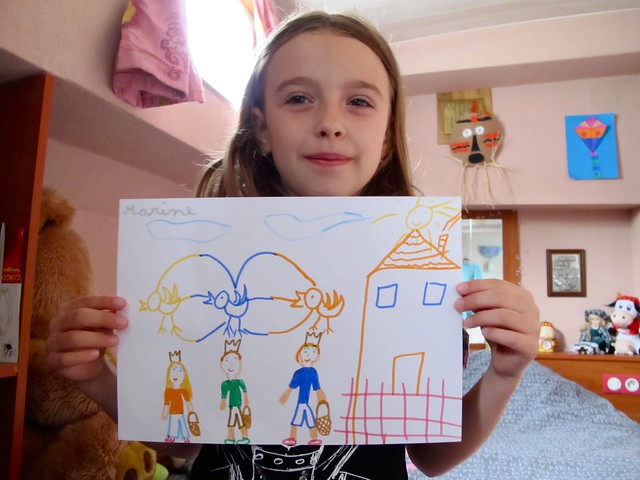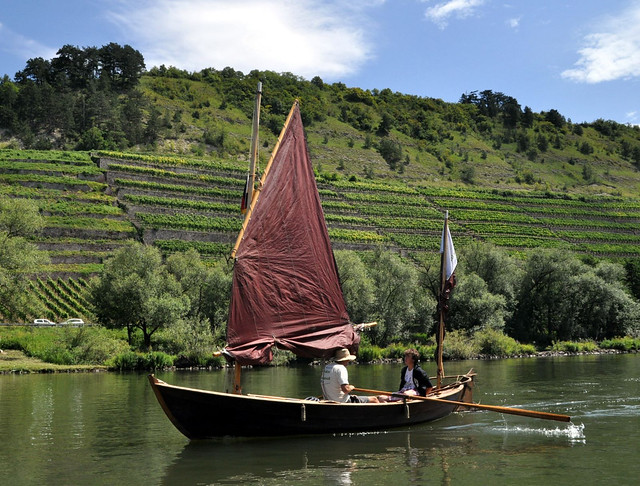
We slip the moorings from Wertheim early in the morning, on the 20th of July, with a brand new crew made by Paolo, Massimo, Holger and me. It rains and a rather annoying wind sweeps the water: We have a hard time to get out from the Tauber river, where Clodia is docked. Entering the Main, however, the wind is on our tail and we run fast with two reefs tucked in.
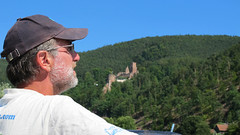 Still, this river amazes me: Steep sided valleys and castles, coniferous forest, I feel like being in the Alps. Our day is alternating between headwind or tailwind depending on the direction of the meanders we’re in. Then, when the evening comes, we stop for the night in a little village called Urphar, mooring to a pontoon on the side of a camping.
Still, this river amazes me: Steep sided valleys and castles, coniferous forest, I feel like being in the Alps. Our day is alternating between headwind or tailwind depending on the direction of the meanders we’re in. Then, when the evening comes, we stop for the night in a little village called Urphar, mooring to a pontoon on the side of a camping.
We drop the anchor toward the center of the river to keep the distance from the pontoon itself, to avoid getting bumped into it by the waves coming from the big ships passing overnight.
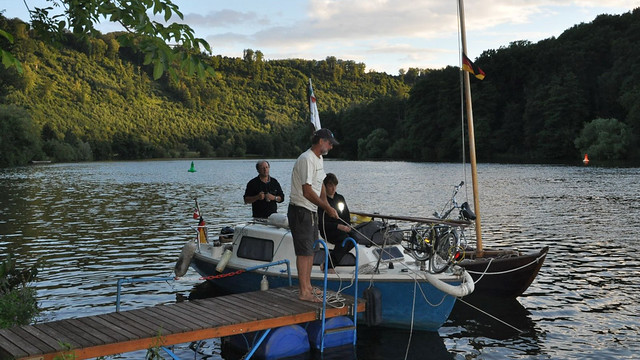
Holger ed I go toward a Garni that looks good, even if somebody tells us that’s closed. Well, let’s give it a try! We find an open door. Silence.
We get in: Inside the lights are dimmed and we see a man sitting on a bench, many set tables around him. Holger asks if it would be possible to get a couple of beers: “Nein… Geschlossen… Montag…” (Not, closed, it’s Monday).
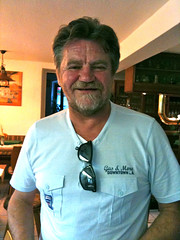 I thank him anyway and so does Holger, telling him about what we’re doing. His expression changes: He hushes up for a moment, then invites us to take a sit.
I thank him anyway and so does Holger, telling him about what we’re doing. His expression changes: He hushes up for a moment, then invites us to take a sit.
He shortly comes back with two large Weissbiers in his hands, telling that we’ll be his guests. A world strikes me: He pats my shoulder saying “respekt”, while his eyes shine!
Thanks Volkmar, that’s his name: Your “respekt” and your look have repaid me, all at once, of everyone who laughed at me, who had already decided for a “no”. They’d never know it, but it’s them who gave me the right boost to take this journey.
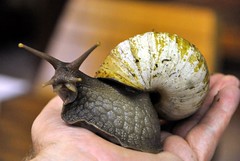 I have to be grateful to the “no”, the defeatists, the racists, those worried, the destructives, the selfish, because it’s thanks to them that all of this takes place, to transform their point of view from the inside, carefully and not judging. Volkmar gives us two more beers showing me the biggest snail that I’ve ever seen. It’s African and on his hand, with sheer elegance, seems to express love. That he returns.
I have to be grateful to the “no”, the defeatists, the racists, those worried, the destructives, the selfish, because it’s thanks to them that all of this takes place, to transform their point of view from the inside, carefully and not judging. Volkmar gives us two more beers showing me the biggest snail that I’ve ever seen. It’s African and on his hand, with sheer elegance, seems to express love. That he returns.
We have a quiet night and an enchanted wake up: The mist’s rising from the water and a few curious ducks come to see me.
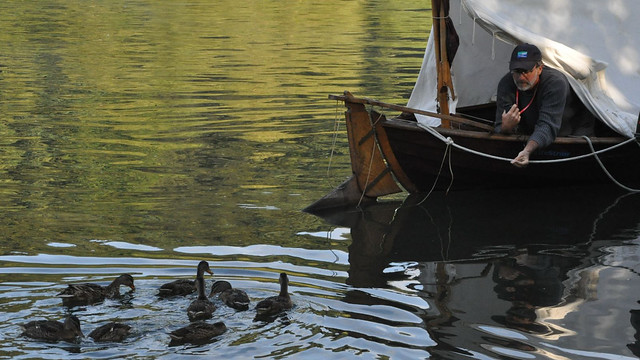
Volkmar and his wife offer a good breakfast to all the four of us, giving food and beers. Bettina gives us beers and another man beers still. We’re in Bavaria, the stow is full: Of beers, of course! Beer is food, as Holger says, so I shouldn’t be starving to death (or at least I’ll die in a very good mood…)
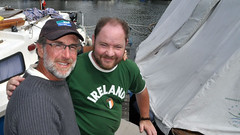 The intake of beer in Bavaria is twice as much that of Germany, that’s in turn three times that of Italy. In Bavaria they drink about 240 litres of beer per year, per person. These figures come from a leaflet that’ve been given in a brasserie in France, in Saint Nicolas de Port. By then, I discarded them as unbelievable. Now I know that’s possible!
The intake of beer in Bavaria is twice as much that of Germany, that’s in turn three times that of Italy. In Bavaria they drink about 240 litres of beer per year, per person. These figures come from a leaflet that’ve been given in a brasserie in France, in Saint Nicolas de Port. By then, I discarded them as unbelievable. Now I know that’s possible!
We set off after a nice evening that seemed like a lifetime. Lock after lock (so huge) we’ve already got halfway through this magical river. In Marktheidenfeld we’re waited by a journalist. He takes many pictures but doesn’t ask anything. He’ll write a wonderful article, thanks to Holger I believe, who gives him a copy written after four days aboard.
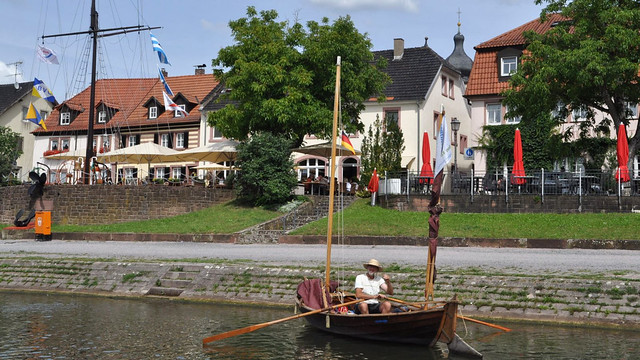
Living the river is quite different than looking at it from the side. All the books about rivers that I’ve read, including the beautiful “Danubio” by Magris (who has navigated on the Danube, though, but by motorboat) did not grasp the real essence, the power, the sheer pureness of this complex being.
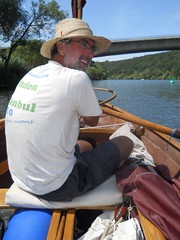 What doesn’t get through, in my opinion, is the most important thing: Life. Everything comes from those rivers, the ocean is feed by rivers, we’re born along the rivers. And we get back there, sooner or later. Writers from all the world, get aboard! But by rowing, riding, sailing! Please, without a motor, that steals that marvellous thing that’s physical effort.
What doesn’t get through, in my opinion, is the most important thing: Life. Everything comes from those rivers, the ocean is feed by rivers, we’re born along the rivers. And we get back there, sooner or later. Writers from all the world, get aboard! But by rowing, riding, sailing! Please, without a motor, that steals that marvellous thing that’s physical effort.
Else, you won’t understand. You’re water at 70 percent and you have to vibrate along with the same wave lenght of it. If not, you’ll write a river of words but you’ll never really tell about the river. All in all, I can’t talk about it too, I’m a humble water follower yet!
After a tasty plate of Spätzle (potato dumplings with many other things) we set seils to Lohr Am Main. The current get stronger, so I row faster but unavoidably slow down: A very very hard leg.
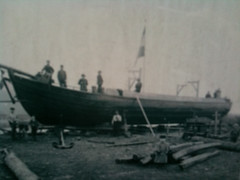 I get pulled by Serena for 7 km because I can’t go ahead and the sky is really menacing: I’ve still to be careful about my health. I drop the lace a few Kilometres before Lohr, an old port where the fishermen still work. They spread their big nets just beyond the locks, straight from the fishing boat.
I get pulled by Serena for 7 km because I can’t go ahead and the sky is really menacing: I’ve still to be careful about my health. I drop the lace a few Kilometres before Lohr, an old port where the fishermen still work. They spread their big nets just beyond the locks, straight from the fishing boat.
I see old pictures of the shipyards, of the wooden raft sailing downstream, and of people leaving along the river, thanks to the river. And the marks of the floods, written on the walls. Arrived to Lohr, we look for a place to eat but a lone light shines in a desert town: We’re too late as usual!
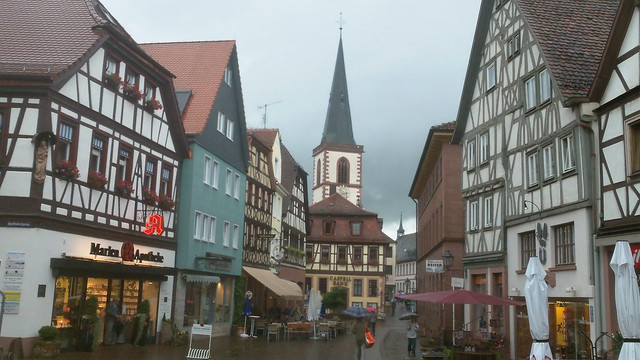
The light smells by pizza and comes from an Italian restaurant, the only place open. Despite our proposition to favour local food, we hungrily get in. Salvatore (another one) welcomes us and serves me an extraordinary plate of “gnocchi alla bava”. Thanks Salva!
In Lohr we’re reached by Enrico, who’s riding by bike from Glasgow to Ukraine, and has booked a few days with us, aboard Clodia, through this website.
He tells us about his reckless life, a childhood in Sicily, Catania, then Rome and Glasgow.
The next morning I meet a man over a wheelchair, and a strong woman on his side. He wears a captain’s hat, his name’s Manne and lives aboard. He gives me a Bavarian flag and a few beers from Aschaffenburg, from where he comes. His story is strong: Struck by a stroke some years ago, he doesn’t give up the boat and builds a system to get hoisted and move aboard. In his eyes, I can see the passion and the admiration, the sadness and the strenght whom has won it. When you have little, you make do with what you’ve got. But Manne has got a lot! Thanks to the river.
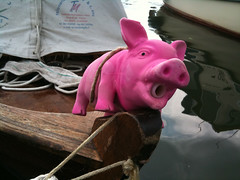 I also see Frank and Jessie who give me Paula, a grunting rubber pig that’s now at bow on Clodia, and always makes me smile. Thanks.
I also see Frank and Jessie who give me Paula, a grunting rubber pig that’s now at bow on Clodia, and always makes me smile. Thanks.
The current is now too strong and the effort is terrible, I miss Bruno even here. In the end, we get to Wernfeld, after just 12 very hard Kilometres.
The Main has overflown, the banks are under water. I meet Harim, who already followed me with his kayak in Lohr, and our evening gets by with a mixture of pennette (a type of pasta, gift of Volkmar) with tomato sauce cooked by Paolo and wurstel grilled by Harim and Moni.
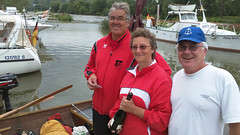 We’re moored in a wonderful marina, surrounded by nature: The only noise comes from the trains passing very often, in the night too. But this is good, it means less trucks on the roads. We also meet Günther, who gives me lots of food and Hermine and her husband who want to donate me 20 euros. Thanks for those gifts. Fantastic Germany.
We’re moored in a wonderful marina, surrounded by nature: The only noise comes from the trains passing very often, in the night too. But this is good, it means less trucks on the roads. We also meet Günther, who gives me lots of food and Hermine and her husband who want to donate me 20 euros. Thanks for those gifts. Fantastic Germany.
Early in the morning, we struggle to win our lazyness (and a bit of healty, logical, worries) to face an ever increasing current.
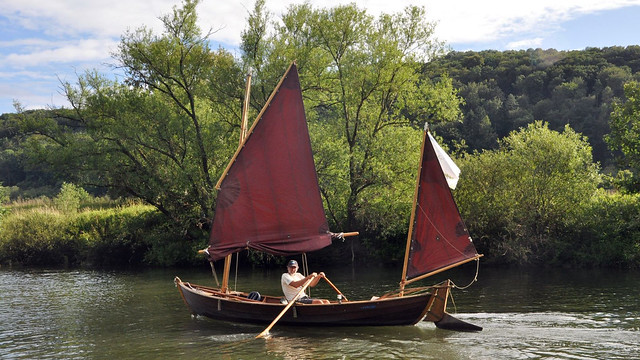
The game is immediately very tough. When I get out from the protection given by the marina, rowing at my best, I just can’t move! I try to change direction and get back, when on the other side of the river the current gets weaker and, as a miracle, the wind comes to my aid. My enemy-friend.
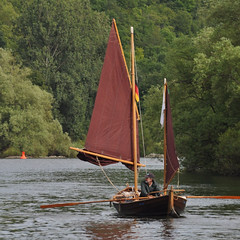 Now is on my side and I’m happy, a force of nature helps me in fighting another strong force of nature. Wind against current, and Clodia built to sail: And sail it does, very well. People stare at me, it’s crazy to go upstream against this current, reaching as much as 6km per hour, faster than my rowing speed.
Now is on my side and I’m happy, a force of nature helps me in fighting another strong force of nature. Wind against current, and Clodia built to sail: And sail it does, very well. People stare at me, it’s crazy to go upstream against this current, reaching as much as 6km per hour, faster than my rowing speed.
On the sides I always find a passage, touch the trees, sometimes I turn, stop and restart. It’s a fight made of directions, resistance, attention, cunning. The art of river navigation.
Konrad would be happy. With a motorboat it’s so easy and ordinary: I’m enjoying it, even if I’m dead beat. Hours by sails and oars, oars and sails, not a moment to rest.
And I’m not a good sailor. As I said, I miss Bruno who’s a magician in these situations. Water observation is critical to foresee the next move, the submerged obstacles, the trunks and the big rocks.
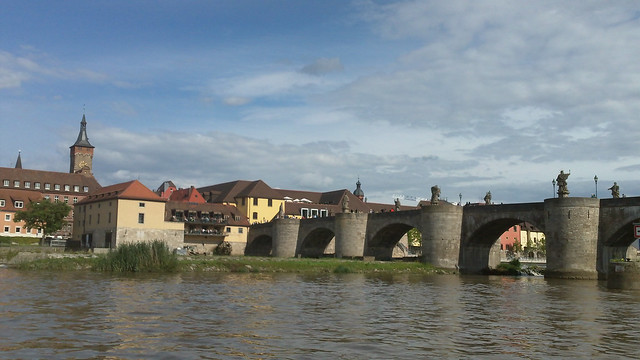
However, this leg is glorious. I get to Würzburg pushed by so much wind: Here the Main, surrounded by vineyards, isn’t any wider than 30 metres. The impressive current makes waves so high that looks like rapids. I’m grateful to this wind: By rowing it would’ve been impossible to make it!
The last bridge crossing is a struggle, 10 minutes for 30 metres. But now I see Würzburg, with its onion-shaped domes and its castle nestled between the vineyards. Würzburg is in the vineyards! After a lock, I turn back and see a marvellous bridge, with many statues placed at its guard, and a deep green in the background.
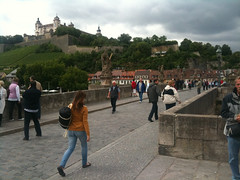 In the Hafen Bar marina we’re welcomed by Coony, Tom and Alwin. They have read the half page of the Main Post newspaper with the article about us. Wonderful welcome, fantastic location, in a protected bend of the Main, overlooking an island reserved to non-human animals. Tonight we can listen to plenty of music around! There’s a graduation party and in Würzburg live something like 30.000 students. A very nice, royal, city. Today we visit the “Residenz” housing the frescoes by Giovan Battista Tiepolo.
In the Hafen Bar marina we’re welcomed by Coony, Tom and Alwin. They have read the half page of the Main Post newspaper with the article about us. Wonderful welcome, fantastic location, in a protected bend of the Main, overlooking an island reserved to non-human animals. Tonight we can listen to plenty of music around! There’s a graduation party and in Würzburg live something like 30.000 students. A very nice, royal, city. Today we visit the “Residenz” housing the frescoes by Giovan Battista Tiepolo.
Alex and Manuela from their boat greet me, they’ve helped us in Lohr. Nearly old chaps! In the evening we see a few little fires lit on a nearby boat, that’s equipped with tables and benches: The marina’s owner, very kind, invites us for dinner, on top of granting free mooring and services. A true gentleman.
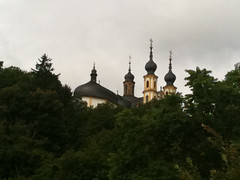 In Würzburg I meet the Orient. I get this feeling, even if I’m still so far away. However, the shape of the church over us speaks clear and loud. But, where does the orient begin?
In Würzburg I meet the Orient. I get this feeling, even if I’m still so far away. However, the shape of the church over us speaks clear and loud. But, where does the orient begin?
Let’s take a look! A big hug.
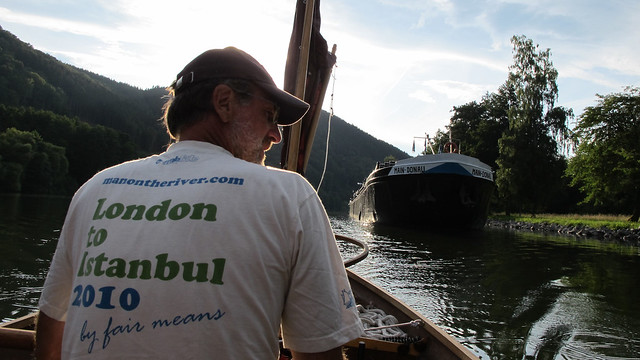
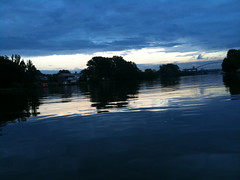 So, if you want to have an easy sleep, the city is not your ideal choice…
So, if you want to have an easy sleep, the city is not your ideal choice…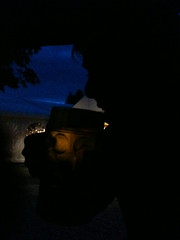 In the evening, waiting for Fine to reach us (she was stuck in Frankfurt to fix her laptop and is coming here by train), Bruno and I enjoy a wonderful local beer, talking about nice things and future projects. When you’re with Bruno, even when it rains the sky looks clear: His sun enlights everything and everyone!
In the evening, waiting for Fine to reach us (she was stuck in Frankfurt to fix her laptop and is coming here by train), Bruno and I enjoy a wonderful local beer, talking about nice things and future projects. When you’re with Bruno, even when it rains the sky looks clear: His sun enlights everything and everyone!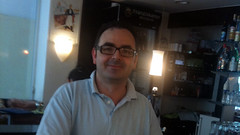 He was frustrated by a dark side of the wonderful and sunny Apulia (an italian region), where is really hard to find a decent job. So, he decided to travel up north like many others before: In the bag, he packed a creativity that is bringing him success. Thanks Salva for your help and for your delicious plates.
He was frustrated by a dark side of the wonderful and sunny Apulia (an italian region), where is really hard to find a decent job. So, he decided to travel up north like many others before: In the bag, he packed a creativity that is bringing him success. Thanks Salva for your help and for your delicious plates.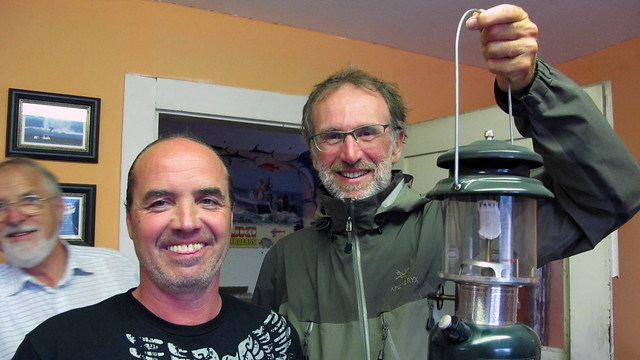
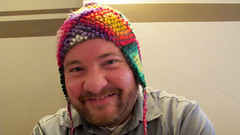 Late in the afternoon, we meet Holger, a local journalist from Hanau who read about our project in the newspaper and has contacted us through this website and Facebook. A nice interview and a few photos are enough to begin a friendship that will take him to join us aboard for a while, in a few days from now.
Late in the afternoon, we meet Holger, a local journalist from Hanau who read about our project in the newspaper and has contacted us through this website and Facebook. A nice interview and a few photos are enough to begin a friendship that will take him to join us aboard for a while, in a few days from now.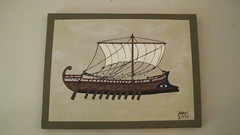 We’re now in the
We’re now in the 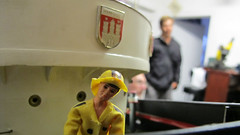 We have a wonderful time, enjoying the food made by a palestinian friend. Uli’s house is beautiful indeed, huge and full of bizarre items (ship and car models, old posters, uncanny machines), made even more gorgeous by a big dog and overall by his partner, a tall and strong humorous lady who immediately wins us.
We have a wonderful time, enjoying the food made by a palestinian friend. Uli’s house is beautiful indeed, huge and full of bizarre items (ship and car models, old posters, uncanny machines), made even more gorgeous by a big dog and overall by his partner, a tall and strong humorous lady who immediately wins us.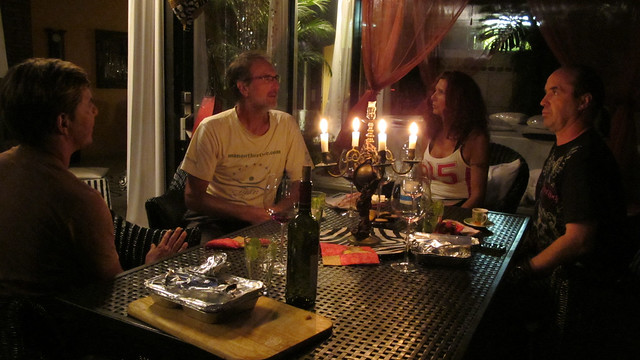
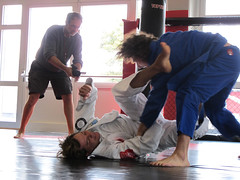 The gymn is wonderful: Achilleas and Bruno are locked in combat. Bruno is out of training by 8 years, but by higher grade. Achillas, well trained and fit, learns. Watching them fighting is fantastic, they’re aggressive in a friendly way. It’s a tridimensional metaphor of war, a peaceful one though. Strange but true!
The gymn is wonderful: Achilleas and Bruno are locked in combat. Bruno is out of training by 8 years, but by higher grade. Achillas, well trained and fit, learns. Watching them fighting is fantastic, they’re aggressive in a friendly way. It’s a tridimensional metaphor of war, a peaceful one though. Strange but true!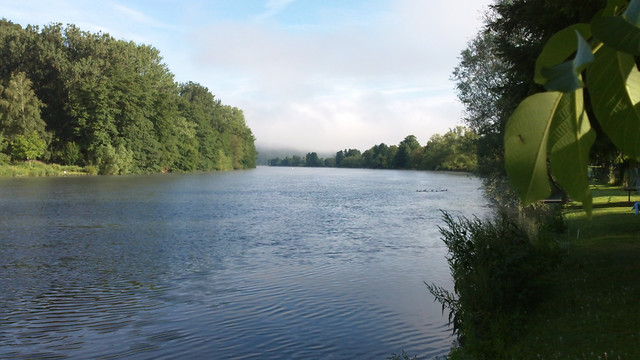
 She shows us a nice t-shirt depicting the Che, and cooks ravioli. We’re not missing beer, of course, lots of it since we’re in Bavaria. In the meantime, Peter plays the accordion: we have a good time tonight, as very often along the rivers. In the morning I ask him to play aboard Clodia, and his music gets through the water and to the fish. Marvel! Such as
She shows us a nice t-shirt depicting the Che, and cooks ravioli. We’re not missing beer, of course, lots of it since we’re in Bavaria. In the meantime, Peter plays the accordion: we have a good time tonight, as very often along the rivers. In the morning I ask him to play aboard Clodia, and his music gets through the water and to the fish. Marvel! Such as 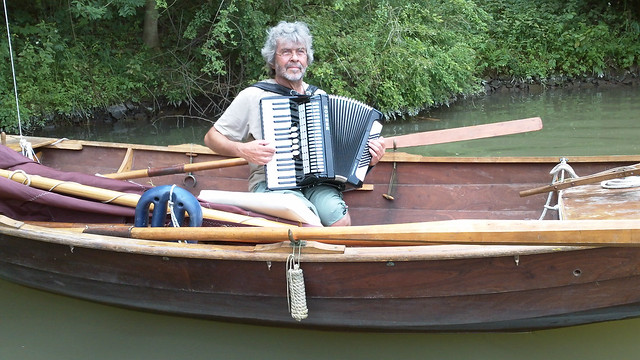
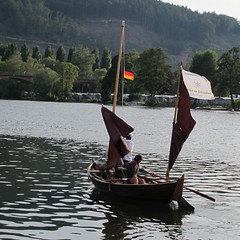 The river is clean, lively despite the cruise liners moving an impressive mass of water that eradicates everything on its way, including Clodia if we don’t take care.
The river is clean, lively despite the cruise liners moving an impressive mass of water that eradicates everything on its way, including Clodia if we don’t take care.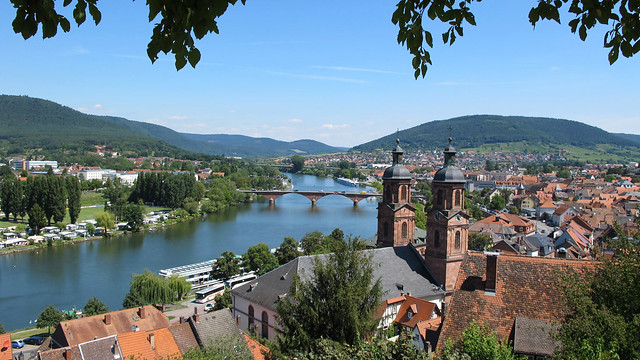
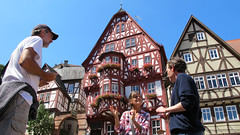 Miltenberg is quite amazing, with its decorated bavarian houses in the typical wood and brick structure, often by using the nice local pink stone.
Miltenberg is quite amazing, with its decorated bavarian houses in the typical wood and brick structure, often by using the nice local pink stone.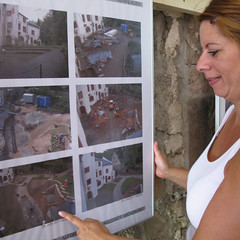 Annette studies food sciences (she’s a crudist believer) and she gives us plenty of marvels to eat!
Annette studies food sciences (she’s a crudist believer) and she gives us plenty of marvels to eat!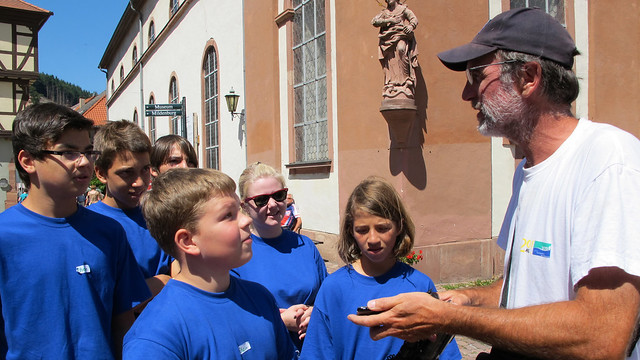
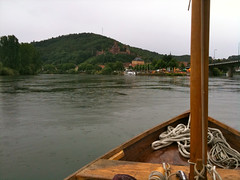 When we get to Wertheim, early in the morning, it’s rainy and windy. We moor and see Günter, a kind big man that we had already met a few days ago in a lock: he offers me a coffee and a wark breakfast.
When we get to Wertheim, early in the morning, it’s rainy and windy. We moor and see Günter, a kind big man that we had already met a few days ago in a lock: he offers me a coffee and a wark breakfast. 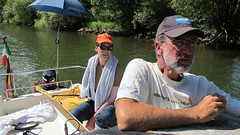 The rain makes the river stronger: I know what I’m in for. The rivers are made by water, so lots of water has to go downstream while we’re travelling upstream!
The rain makes the river stronger: I know what I’m in for. The rivers are made by water, so lots of water has to go downstream while we’re travelling upstream! 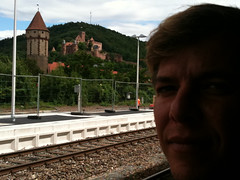 He has given me a massive quantity of help, passion, suggestions and drunk a massive quantity of beer (only joking!!). I greet him just before weeping like a child while I leave him in the train station. It wasn’t for Bruno, and Fine, this year I would not have started the journey.
He has given me a massive quantity of help, passion, suggestions and drunk a massive quantity of beer (only joking!!). I greet him just before weeping like a child while I leave him in the train station. It wasn’t for Bruno, and Fine, this year I would not have started the journey.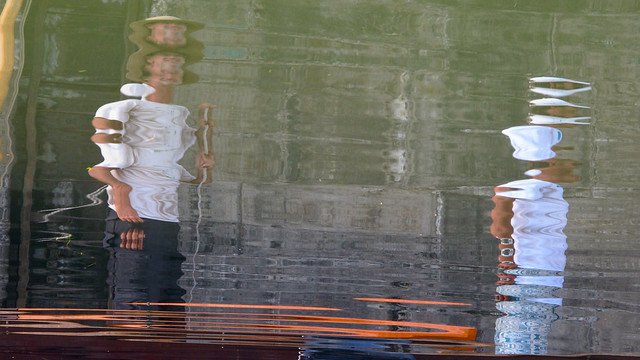
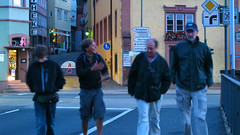 Paolo Muran, documentar’s director, comes along with his son Massimo, just in time to say goodbye to Bruno while the sky starts crying in solidarity. The journey must go ahead and the train too: The next day we set sails without Bruno and Fine, who has to undertake a couple of health check-ups (and Tilmann leaves with her).
Paolo Muran, documentar’s director, comes along with his son Massimo, just in time to say goodbye to Bruno while the sky starts crying in solidarity. The journey must go ahead and the train too: The next day we set sails without Bruno and Fine, who has to undertake a couple of health check-ups (and Tilmann leaves with her).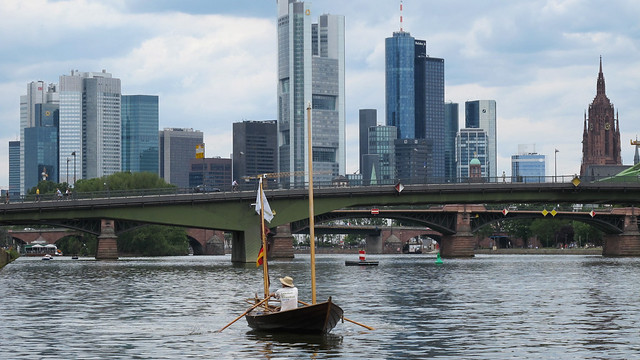
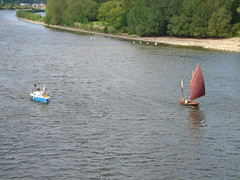 Despite this, we can see lots of wildlife, such as very big duck and swans, whose regal beauty would glorify even a less stunning scenery than the one on show here, resembling Altdorfer art.
Despite this, we can see lots of wildlife, such as very big duck and swans, whose regal beauty would glorify even a less stunning scenery than the one on show here, resembling Altdorfer art.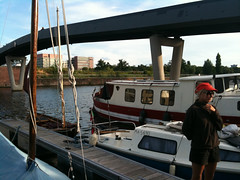 I follow him in a small garden where, seated on a bench, he writes me many things that I’m going to put into practice. I’ll tell you more soon: In the meantime I have to finish off that little food left into Clodia’s storeroom.
I follow him in a small garden where, seated on a bench, he writes me many things that I’m going to put into practice. I’ll tell you more soon: In the meantime I have to finish off that little food left into Clodia’s storeroom.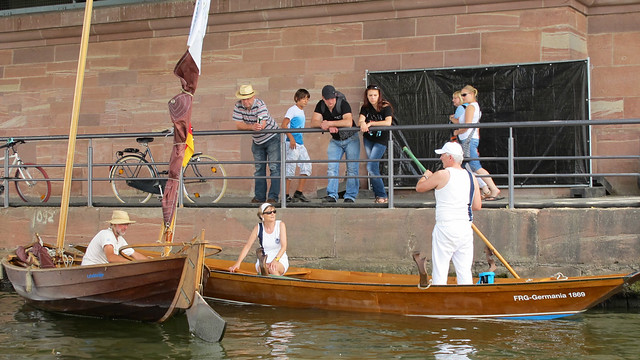
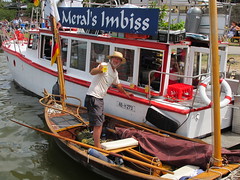 One hundred metres away, on the right bank of the Main and in the midst of a crowd of people, I spot a bizarre boat bearing a familiar name: “Istanbul”.
One hundred metres away, on the right bank of the Main and in the midst of a crowd of people, I spot a bizarre boat bearing a familiar name: “Istanbul”.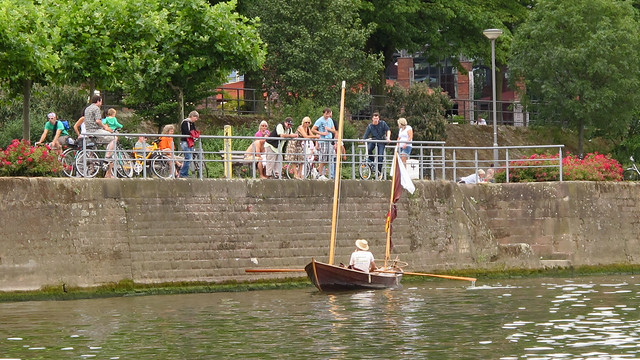
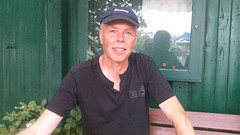 Just after the first lock, the rain comes: I see a sailboat in the distance and its captain, Johannes, comes close offering to pull me.
Just after the first lock, the rain comes: I see a sailboat in the distance and its captain, Johannes, comes close offering to pull me.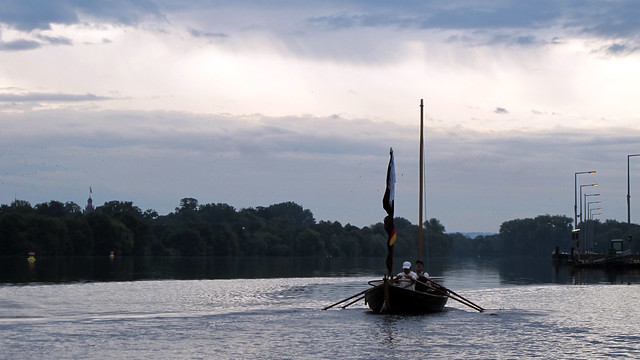
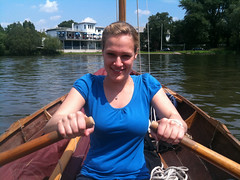 In the morning, miraculously, we wake up under a bright and warm sun, that dries our bones and everything that have got drenched the night before.
In the morning, miraculously, we wake up under a bright and warm sun, that dries our bones and everything that have got drenched the night before.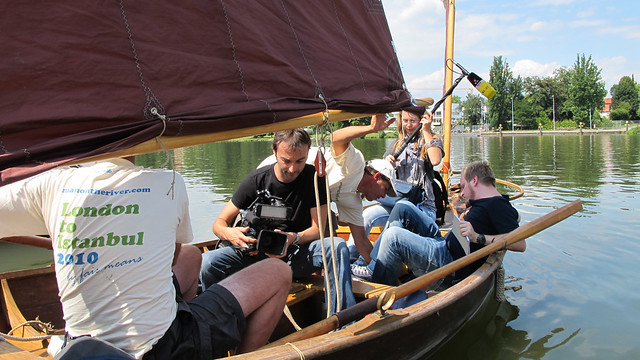
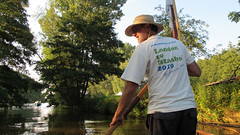 Not even the time to dock (after taking a wrong turn and getting stuck) and we’re welcomed by a clone of Eddie Vedder, the legendary singer of Pearl Jam, in a pick-up truck. An open smile and very good, self-confident manners: He’s Jörn Lassig.
Not even the time to dock (after taking a wrong turn and getting stuck) and we’re welcomed by a clone of Eddie Vedder, the legendary singer of Pearl Jam, in a pick-up truck. An open smile and very good, self-confident manners: He’s Jörn Lassig.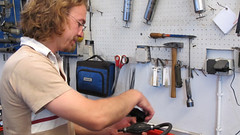 He takes us to his amazing workshop giving us a few spare parts for the temporary small engine used by Serena (the support boat steered by Fine).
He takes us to his amazing workshop giving us a few spare parts for the temporary small engine used by Serena (the support boat steered by Fine). 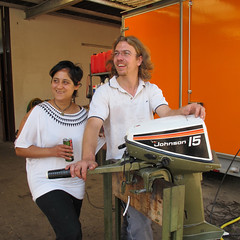 For free!! He doesn’t want any money at all! Fantastic Jörn! We invite him aboard for a beer and late in the evening, despite his busy agenda, he pays us a visit along with his lovely wife Silvia. We all have a good time, sharing many interests.
For free!! He doesn’t want any money at all! Fantastic Jörn! We invite him aboard for a beer and late in the evening, despite his busy agenda, he pays us a visit along with his lovely wife Silvia. We all have a good time, sharing many interests.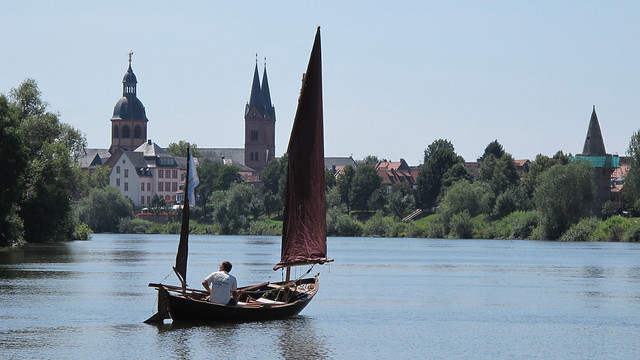
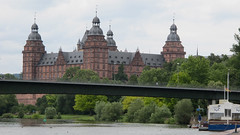 It had to be a very wealthy place.
It had to be a very wealthy place.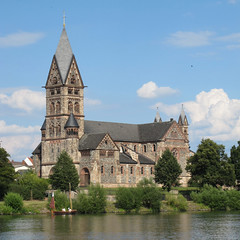 In the Aschaffenburg marina we get greeted by a man with a nice smile: I immediately know that we stumbled into one of our usual guardian angels. His name’s Uli Becker.
In the Aschaffenburg marina we get greeted by a man with a nice smile: I immediately know that we stumbled into one of our usual guardian angels. His name’s Uli Becker.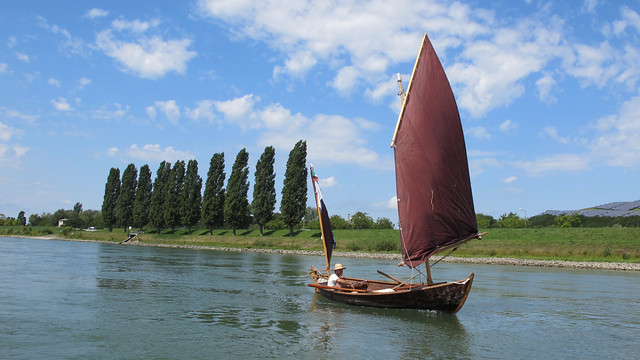
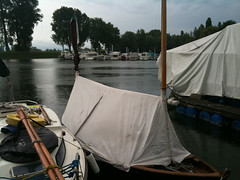 First of all, I wish to thank Norbert and Lukas from the Cercle Nautique de l’Alsace du Nord, who, on top of granting Clodia free mooring, came to pick us up at the train station. Thank you very much indeed!
First of all, I wish to thank Norbert and Lukas from the Cercle Nautique de l’Alsace du Nord, who, on top of granting Clodia free mooring, came to pick us up at the train station. Thank you very much indeed!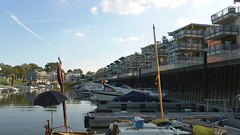 Our navigation gets on quietly, mostly by rowing with the occasional upwind sail, for about 61 km up to Speyer, where we meet once again Sandro and his sister, Sara, on their way back from Amsterdam. We stop in a very modern and efficient Marina, although surrounded by a rather disturbing urbanization.
Our navigation gets on quietly, mostly by rowing with the occasional upwind sail, for about 61 km up to Speyer, where we meet once again Sandro and his sister, Sara, on their way back from Amsterdam. We stop in a very modern and efficient Marina, although surrounded by a rather disturbing urbanization.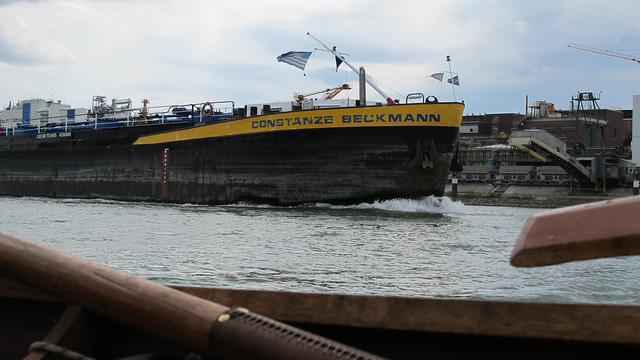
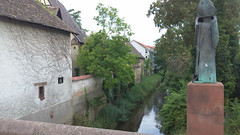 In Speyer we have a great evening with Sandro and Sara, indulging in a culinary escapade in a restaurant called “Porto Vecchio Veneziano” (The Old Venetian Harbour). We’re very tired and hungry after so many kilometers rowed under a blazing sun, so we surrender once more to the consumer society.
In Speyer we have a great evening with Sandro and Sara, indulging in a culinary escapade in a restaurant called “Porto Vecchio Veneziano” (The Old Venetian Harbour). We’re very tired and hungry after so many kilometers rowed under a blazing sun, so we surrender once more to the consumer society.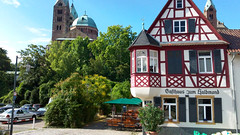 And we consume, frugally, but we consume, and paying for it of course. Early in the morning I go for a quick tour of the city of Speyer, that’s quite nice: Its big cathedral (“Kaiserdom”) is listed as World Heritage Site by the Unesco. It houses the tombs of eight kings of Germany, four of which being emperors of the Holy Roman Empire too.
And we consume, frugally, but we consume, and paying for it of course. Early in the morning I go for a quick tour of the city of Speyer, that’s quite nice: Its big cathedral (“Kaiserdom”) is listed as World Heritage Site by the Unesco. It houses the tombs of eight kings of Germany, four of which being emperors of the Holy Roman Empire too.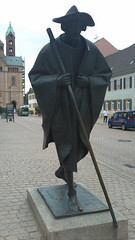 Then I visit a monastery dating 1228, where I find a plaque remembering Edith Stein, religious and philosopher dead in Auschwitz in 1942. Suddenly, a pleasant surprise: The monument to Jakob, a pilgrim of the 14th century who has reached Santiago of Compostela by foot: You can see how light he was travelling! An applause to him: Less is more.
Then I visit a monastery dating 1228, where I find a plaque remembering Edith Stein, religious and philosopher dead in Auschwitz in 1942. Suddenly, a pleasant surprise: The monument to Jakob, a pilgrim of the 14th century who has reached Santiago of Compostela by foot: You can see how light he was travelling! An applause to him: Less is more.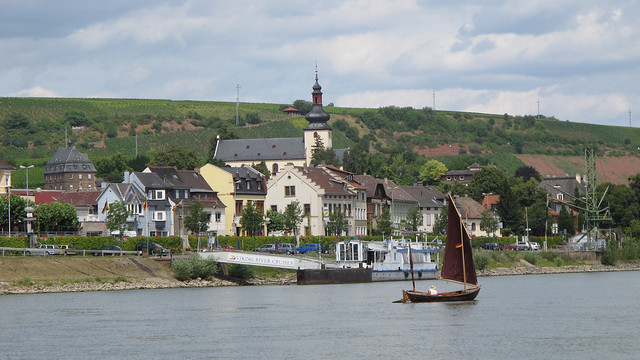
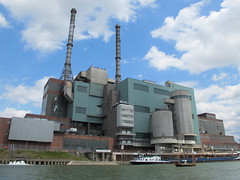 By the river, Mannheim looks huge. Here, in 1868, was stipulated the Convention on the Navigation of the Rhine that still applies.
By the river, Mannheim looks huge. Here, in 1868, was stipulated the Convention on the Navigation of the Rhine that still applies. 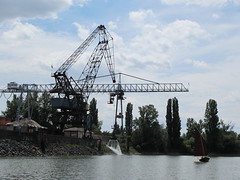 Our evening gets by in front of a good beer and under a line of plane trees reminding me of France.
Our evening gets by in front of a good beer and under a line of plane trees reminding me of France.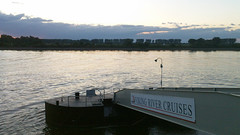 I very much prefer ferries over bridges (such as the mast-chomping ones, specialized on damaging boats led by stupid sailors…).
I very much prefer ferries over bridges (such as the mast-chomping ones, specialized on damaging boats led by stupid sailors…).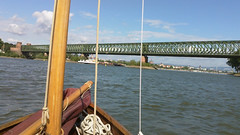 The next day, 4th of navigation along the Rhine, will take us to Mainz, after a 36 km run.
The next day, 4th of navigation along the Rhine, will take us to Mainz, after a 36 km run. 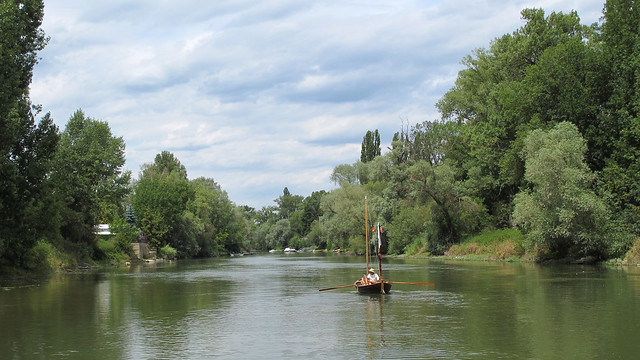
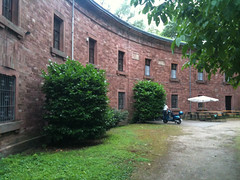 Soon after, commodore Harald comes to visit: He was already aware of our journey and we’re quickly invited to the monthly Club meeting, to tell the full story.
Soon after, commodore Harald comes to visit: He was already aware of our journey and we’re quickly invited to the monthly Club meeting, to tell the full story.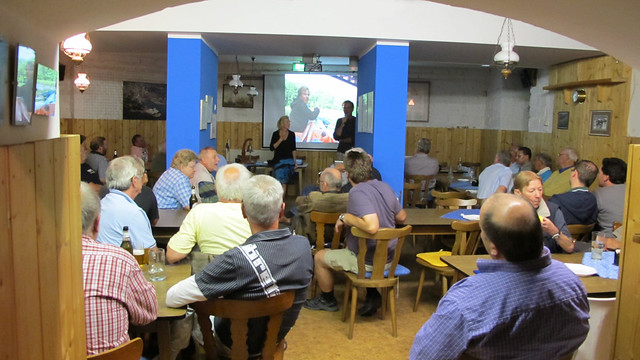
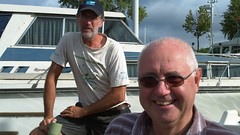 The night is rainy but I sleep like a log under my tent. In the morning the rain has gone, although a nasty wind sweeps up. A friend met last night, Winfried, comes to tell us that the museum where a few roman ships (found in the Rhine) are kept, is closed until September. We’re not the first ones rowing up here.
The night is rainy but I sleep like a log under my tent. In the morning the rain has gone, although a nasty wind sweeps up. A friend met last night, Winfried, comes to tell us that the museum where a few roman ships (found in the Rhine) are kept, is closed until September. We’re not the first ones rowing up here.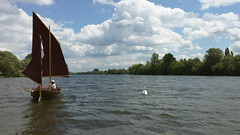 I’m thrilled, the Main is near. Still 2 km on the Rhine then I turn right, raise the two sails and begin an exhilarating, wind-powered flight of 35 km (aside a couple of km through a meander). Just three locks, very easy to pass, slow us down. One of them even has a reduced lock for small boats. What a beauty!
I’m thrilled, the Main is near. Still 2 km on the Rhine then I turn right, raise the two sails and begin an exhilarating, wind-powered flight of 35 km (aside a couple of km through a meander). Just three locks, very easy to pass, slow us down. One of them even has a reduced lock for small boats. What a beauty!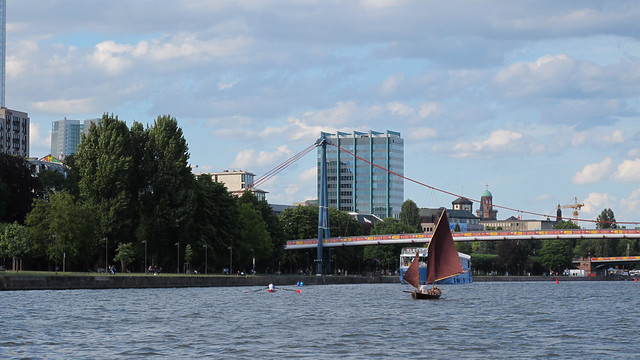
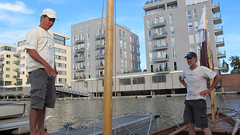 We’re in a very modern suburb of Frankfurt, housing a Marina nestled within an urban plan designed to recover the old docks.
We’re in a very modern suburb of Frankfurt, housing a Marina nestled within an urban plan designed to recover the old docks.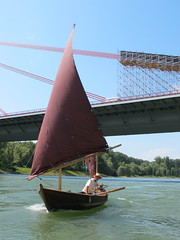 The Sailing Club hosting us is wonderful and today we’ll make a video of the many people navigating along the river.
The Sailing Club hosting us is wonderful and today we’ll make a video of the many people navigating along the river.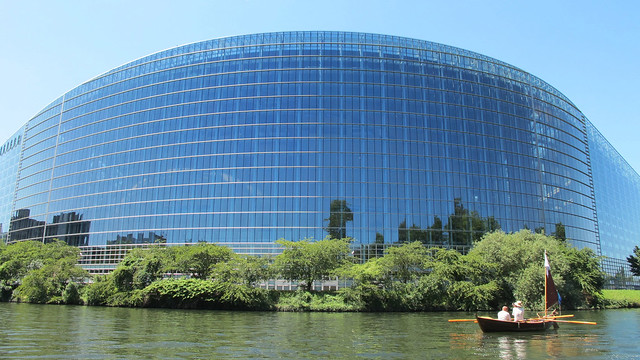
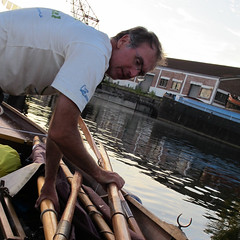 On the opposite, the uncertainty of travelling forces us to look at the world with new eyes, so other people reflect themselves in what you do and what you feel.
On the opposite, the uncertainty of travelling forces us to look at the world with new eyes, so other people reflect themselves in what you do and what you feel.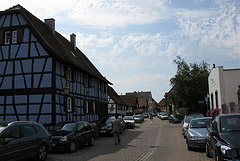 We enjoy a good sleep moored side by side to Rataka, the housboat of Remy and Nadash. At 6 o’clock I neak out to find bread and croissants for Fine, Bruno and me, finding a nice boulangerie in the heart of Vendenheim. At noon, the mayor picks us up for lunch, along with his wife and daughter in law (his son works in Boulogne sur Mer, surveilling the English Channel).
We enjoy a good sleep moored side by side to Rataka, the housboat of Remy and Nadash. At 6 o’clock I neak out to find bread and croissants for Fine, Bruno and me, finding a nice boulangerie in the heart of Vendenheim. At noon, the mayor picks us up for lunch, along with his wife and daughter in law (his son works in Boulogne sur Mer, surveilling the English Channel).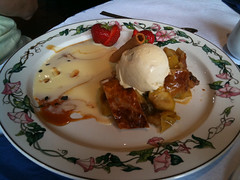 Alsatian cuisine is rich and interesting, too tasty to waste any time in describing it: I have to concentrate on eating like a pig! My dish resembles a bit a Piedmontese recipe, brasato al Barolo, made of savoury meats and French sauces. Fine and Bruno have sauerkrauts and potatoes, with sausages, würstels and well-cooked pork, quite tasty indeed.
Alsatian cuisine is rich and interesting, too tasty to waste any time in describing it: I have to concentrate on eating like a pig! My dish resembles a bit a Piedmontese recipe, brasato al Barolo, made of savoury meats and French sauces. Fine and Bruno have sauerkrauts and potatoes, with sausages, würstels and well-cooked pork, quite tasty indeed.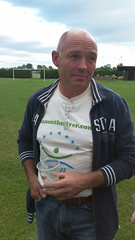 In the meantime we’ve been reached by a much appreciated guest, Karl (Kalle) Fine’s dad, just arrived from Hannover to stay a few days with us.
In the meantime we’ve been reached by a much appreciated guest, Karl (Kalle) Fine’s dad, just arrived from Hannover to stay a few days with us.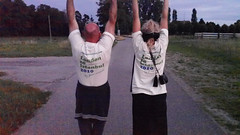 Kalle, nice and strong, has a wonderful job: He works on landscape art, building fabulous and poetical fences and many other objects by using willow timber and other materials that nature has to offer. In the evening we take a walk to Vendenheim, passing maize fields and big cherry trees.
Kalle, nice and strong, has a wonderful job: He works on landscape art, building fabulous and poetical fences and many other objects by using willow timber and other materials that nature has to offer. In the evening we take a walk to Vendenheim, passing maize fields and big cherry trees.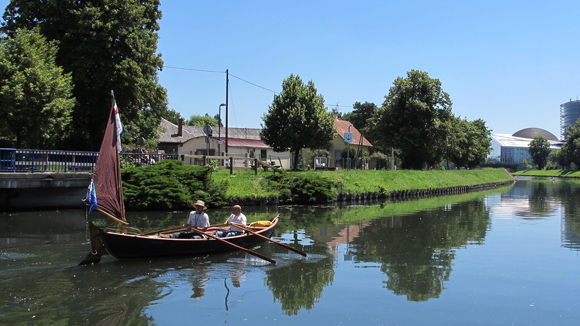
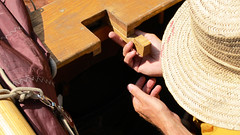 Thanksfully the main traveller of Clodia and the mast lock was wisely built by Roland in such a way to break immediately, avoiding further damages to the structure to the hull in cause of collision with a bridge.
Thanksfully the main traveller of Clodia and the mast lock was wisely built by Roland in such a way to break immediately, avoiding further damages to the structure to the hull in cause of collision with a bridge.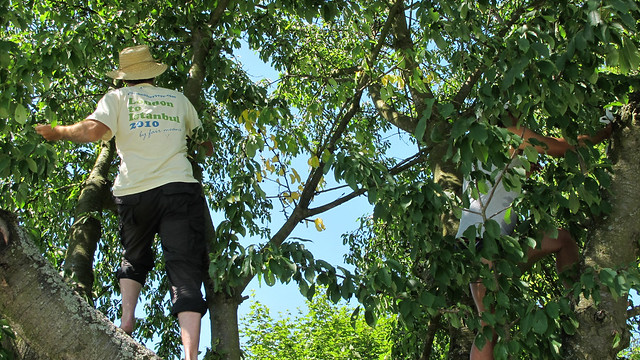
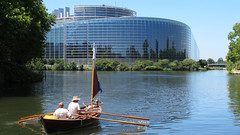 We enter Strasbourg at 2 a’clock of a sticky hot sunday, over 33°C of temperature. We row in front of the European Parliament and its technological show-off: I have to think about all the money that many members of the parliament earn (an Italian member could receive as much as 35.000 EURO per month) while so many people, often more capable, struggle with very low wages. Efficient politicians do exist, but they’re rare birds. I wonder why.
We enter Strasbourg at 2 a’clock of a sticky hot sunday, over 33°C of temperature. We row in front of the European Parliament and its technological show-off: I have to think about all the money that many members of the parliament earn (an Italian member could receive as much as 35.000 EURO per month) while so many people, often more capable, struggle with very low wages. Efficient politicians do exist, but they’re rare birds. I wonder why.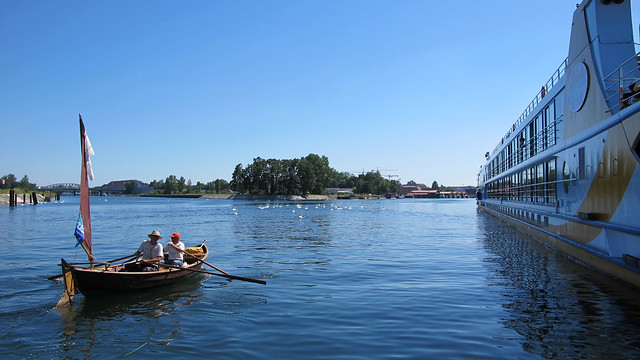
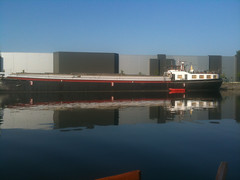 When I get close, she shows me a copy of the DNA (Derniere Nouvelles Alsaciennes), a newspaper with an article written about us and a nice picture of Clodia. Her boat is called Labor and is very big, 55 by 6 mt.: Anne, smiling, kindly invites me to jump aboard for a coffee. How nice, I’m happy to accept. To get on board I have to climb about 3 metres: Much different scales compared with those Peniche on the canals.
When I get close, she shows me a copy of the DNA (Derniere Nouvelles Alsaciennes), a newspaper with an article written about us and a nice picture of Clodia. Her boat is called Labor and is very big, 55 by 6 mt.: Anne, smiling, kindly invites me to jump aboard for a coffee. How nice, I’m happy to accept. To get on board I have to climb about 3 metres: Much different scales compared with those Peniche on the canals.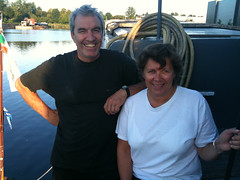 There, I discover a wonderful house and meet Toni, Anne’s partner, who welcomes me. I enjoy a nice coffee and an even nicer conversation with my hosts. Anne and Toni’s business is about culture and their peniche is a huge atelier.
There, I discover a wonderful house and meet Toni, Anne’s partner, who welcomes me. I enjoy a nice coffee and an even nicer conversation with my hosts. Anne and Toni’s business is about culture and their peniche is a huge atelier.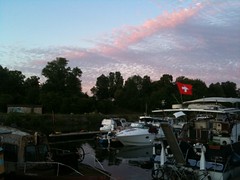 The “liveaboard” community is quite large and quickly welcomes me. The little harbour is pleasant and protected, close to the citadel. As always, we’ll get generously offered free mooring for the two days of stay with Clodia.
The “liveaboard” community is quite large and quickly welcomes me. The little harbour is pleasant and protected, close to the citadel. As always, we’ll get generously offered free mooring for the two days of stay with Clodia.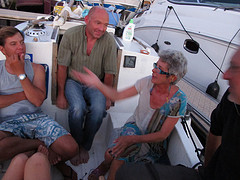 Helene, a theatrical costumes designer, is a charming woman living aboard by six years: unfortunately her beautiful steel boat, dating 1908, has sunk for unknown reasons.
Helene, a theatrical costumes designer, is a charming woman living aboard by six years: unfortunately her beautiful steel boat, dating 1908, has sunk for unknown reasons.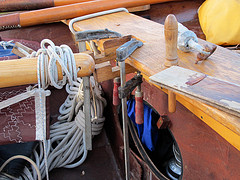 Our day will be as full as usual: We’re waited by many interviews and fixings on Clodia. Yesterday Bruno took care of the most of it however the bulkead has still to be repaired.
Our day will be as full as usual: We’re waited by many interviews and fixings on Clodia. Yesterday Bruno took care of the most of it however the bulkead has still to be repaired.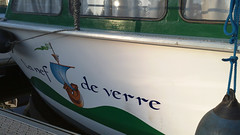 I try to sleep a little in the shadow of a boat, but a woman comes to tell me her interesting story aboard the Glass Boat belonging to Alexandre, master glassmaker. How nice these tales of people that, regardless of age, build a new life. Alexander for instance was a truck driver, but when he turned 50 he decided to change.
I try to sleep a little in the shadow of a boat, but a woman comes to tell me her interesting story aboard the Glass Boat belonging to Alexandre, master glassmaker. How nice these tales of people that, regardless of age, build a new life. Alexander for instance was a truck driver, but when he turned 50 he decided to change.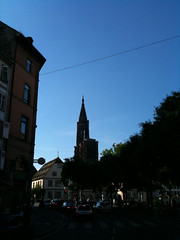 Even inside, the heat is terrible and our “political” day gets quite tiring, however still full of energy and passion. The interview is interesting and intense: We discover the environmental strategies of Strasbourg and I get the impression that Ms Buchmann is a truly passionate and dedicated administrator. Please come to Strasbourg to take a look.
Even inside, the heat is terrible and our “political” day gets quite tiring, however still full of energy and passion. The interview is interesting and intense: We discover the environmental strategies of Strasbourg and I get the impression that Ms Buchmann is a truly passionate and dedicated administrator. Please come to Strasbourg to take a look.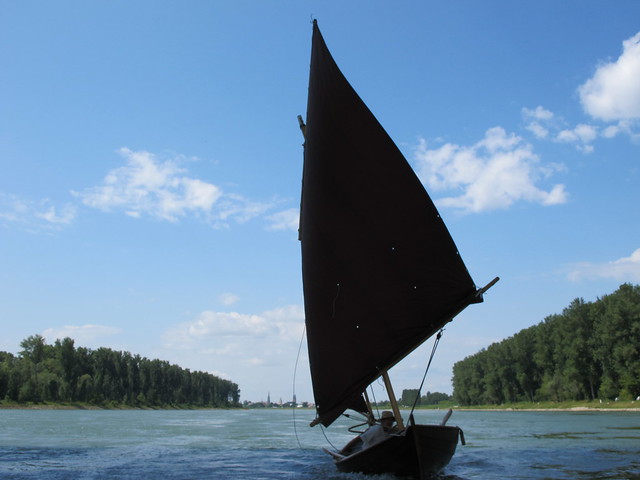
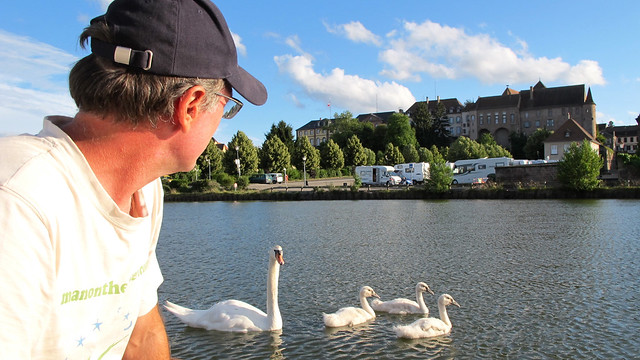
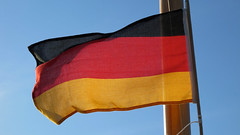 Our Alsatian adventure begun in the Vosges: Language, architecture, flavours had changed. However, at this stage I was really convinced to have landed to Germany, but I’m still in France. So what can we say?
Our Alsatian adventure begun in the Vosges: Language, architecture, flavours had changed. However, at this stage I was really convinced to have landed to Germany, but I’m still in France. So what can we say?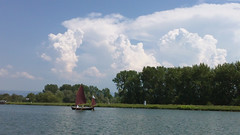 That’s Europe and I’m becoming ever more convinced that the borders were drawn by people either crazy or drunk.
That’s Europe and I’m becoming ever more convinced that the borders were drawn by people either crazy or drunk.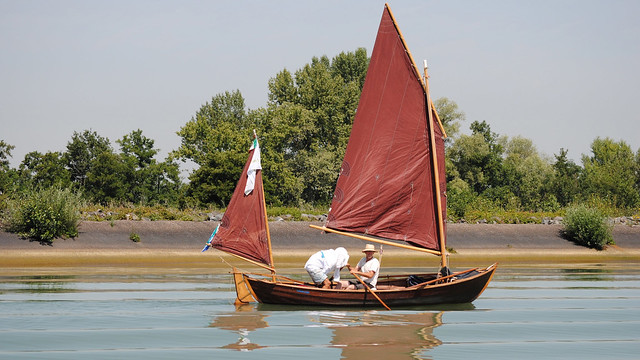
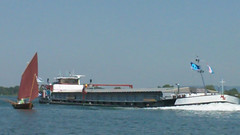 So far the waves are keeping low, we face an opposite yet weak wind and the big barges are fast enough (about 20 Km/h) but very open-eyed on us as we’re on them.
So far the waves are keeping low, we face an opposite yet weak wind and the big barges are fast enough (about 20 Km/h) but very open-eyed on us as we’re on them.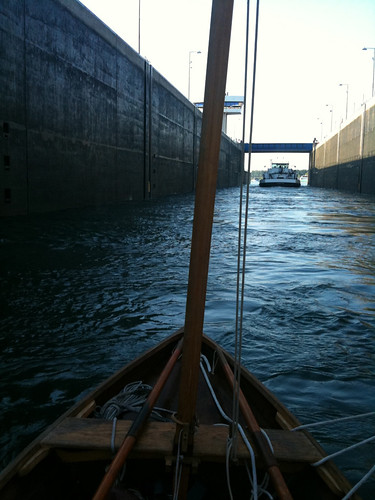
 We look like a mice in an elephant dance party, but these elephants know how to spin.
We look like a mice in an elephant dance party, but these elephants know how to spin.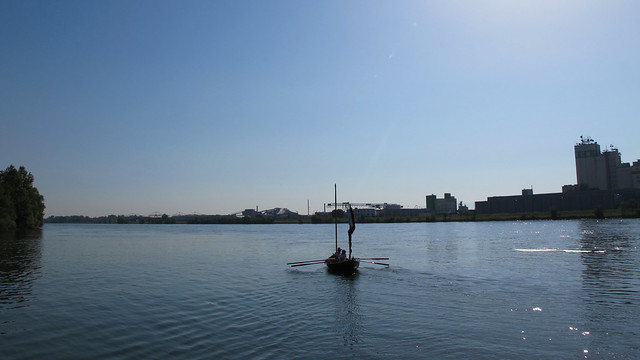
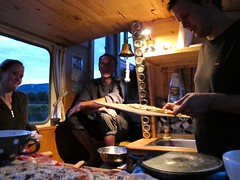 We stopped for two days in Saverne, lovely city, where we’ve been invited for a pizza on the holyday-boat of a nice German couple, Volker and Ilka. Their pizza was beautiful such as their hospitality aboard Grønland, a Dutch Tijalk (a flat bottomed boat) that they’ve completely restored.
We stopped for two days in Saverne, lovely city, where we’ve been invited for a pizza on the holyday-boat of a nice German couple, Volker and Ilka. Their pizza was beautiful such as their hospitality aboard Grønland, a Dutch Tijalk (a flat bottomed boat) that they’ve completely restored. 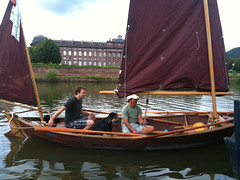 The morning after, Bruno takes Volker aboard Clodia for a sail in the basin facing the wonderful 17th century palace, the Chateau of Saverne, whose majesty has earned it the name “Versailles Alsace“.
The morning after, Bruno takes Volker aboard Clodia for a sail in the basin facing the wonderful 17th century palace, the Chateau of Saverne, whose majesty has earned it the name “Versailles Alsace“.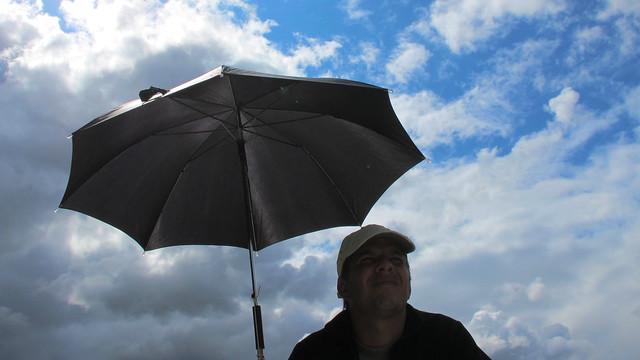
 To reach the city we have to cross as much as 4 waterways in 1 km, a sort of word record!
To reach the city we have to cross as much as 4 waterways in 1 km, a sort of word record!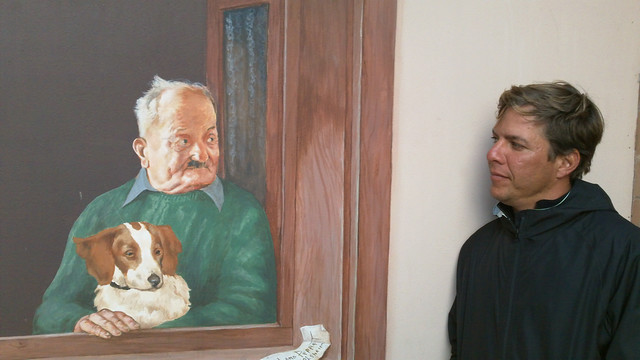
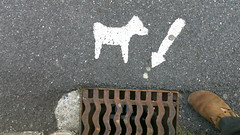 On the walls we see strange paintings of people looking out of the window, and ground signs telling manholes may be used as dog toilets. These clues lead to a conclusion: French mind-set has never worked very well here. After all the majority of surnames is German and everyone is bilingual, since Alsace was Germany for a long time.
On the walls we see strange paintings of people looking out of the window, and ground signs telling manholes may be used as dog toilets. These clues lead to a conclusion: French mind-set has never worked very well here. After all the majority of surnames is German and everyone is bilingual, since Alsace was Germany for a long time.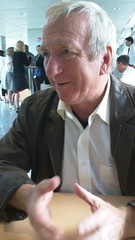 The fist is called Henri Bronner, mayor of Vendenheim and friend of Guy Rougieux. He’s so kind to come to pick us up at 9 o’clock in the morning in Hochfelden, displaying Alsatian punctuality (5 to 7 minutes away from that of Germany, which in turn follows by 5 minutes the Swiss one, unchallenged even by Japanese).
The fist is called Henri Bronner, mayor of Vendenheim and friend of Guy Rougieux. He’s so kind to come to pick us up at 9 o’clock in the morning in Hochfelden, displaying Alsatian punctuality (5 to 7 minutes away from that of Germany, which in turn follows by 5 minutes the Swiss one, unchallenged even by Japanese). Dr Samir Idir shows to Fine and me this technological marvel that gives back water to the big river, who’s seriously ill and therefore under strict observation by the European Community.
Dr Samir Idir shows to Fine and me this technological marvel that gives back water to the big river, who’s seriously ill and therefore under strict observation by the European Community.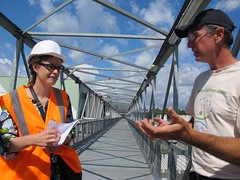 The left-overs of depuration are used to produce natural gas, in such an extent that from next year the plant will be self-sufficient for heat energy and really soon for electricity too (they’re even planning to sell the energy surplus).
The left-overs of depuration are used to produce natural gas, in such an extent that from next year the plant will be self-sufficient for heat energy and really soon for electricity too (they’re even planning to sell the energy surplus).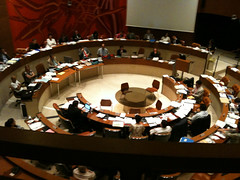 Later on, we are introduced to
Later on, we are introduced to 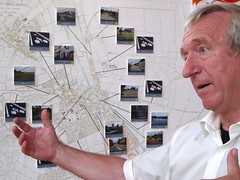 We then go to Vendenheim, where we visit the city hall, an enviable Senior Citizens’ Centre and a sport centre built by using the latest and best energy saving technologies. A dream made real.
We then go to Vendenheim, where we visit the city hall, an enviable Senior Citizens’ Centre and a sport centre built by using the latest and best energy saving technologies. A dream made real.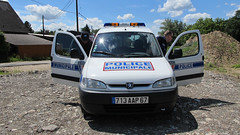 To get back to Hochfelden, where Clodia is moored, we get a lift from Damien, a policeman from Vendenheim.
To get back to Hochfelden, where Clodia is moored, we get a lift from Damien, a policeman from Vendenheim.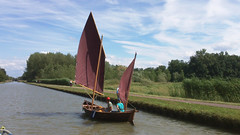 Bruno (who stayed to look after the boat) is impatiently waiting for us, because the wind is strong enough to set sails. We get going very quickly, with Bruno at the tiller and Fine rowing, covering 18 km in 5 hours: Just in time to arrive to Vendenheim where we stop for two days, shaded by a wonderful Dutch boat.
Bruno (who stayed to look after the boat) is impatiently waiting for us, because the wind is strong enough to set sails. We get going very quickly, with Bruno at the tiller and Fine rowing, covering 18 km in 5 hours: Just in time to arrive to Vendenheim where we stop for two days, shaded by a wonderful Dutch boat.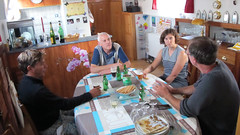 It’s the house of Remy, lock-keeper of the first “ecluse” on the Rhine after Strasbourg. Remy and his wife Nadash, a bycicle postwoman, offer us a hot shower and a tasty dinner, where we’re entertained by stories about the lock and the big river. Their daughter Marine even draws a lovely picture of us that you can see below!
It’s the house of Remy, lock-keeper of the first “ecluse” on the Rhine after Strasbourg. Remy and his wife Nadash, a bycicle postwoman, offer us a hot shower and a tasty dinner, where we’re entertained by stories about the lock and the big river. Their daughter Marine even draws a lovely picture of us that you can see below!